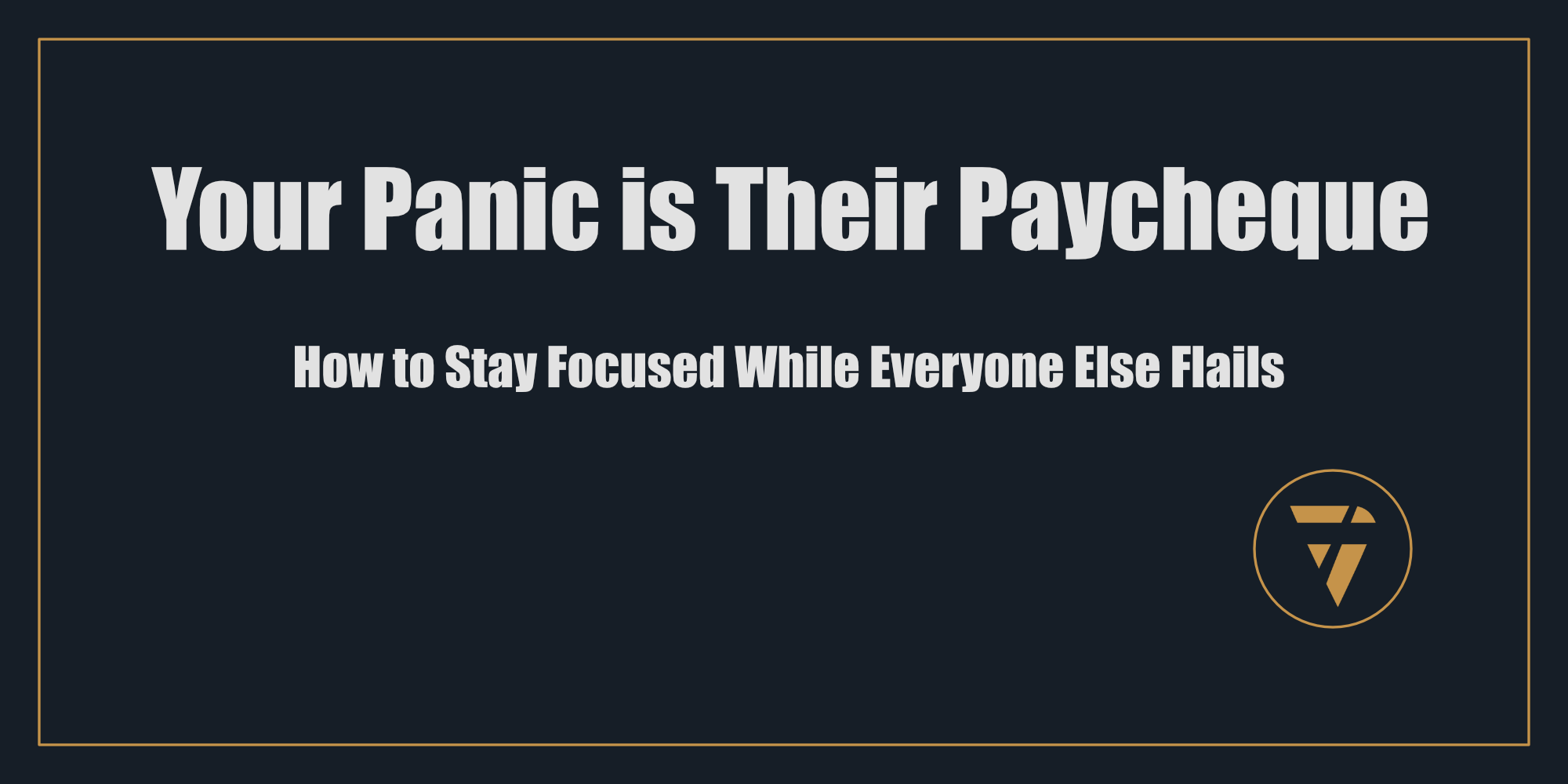Your Panic is Their Paycheque

How to Stay Focused While Everyone Else Flails
In every crisis, there are two kinds of people: the ones who react, and the ones who collect. The first group spirals into anxiety, overcorrects, and makes short-sighted decisions. The second group watches, waits, and capitalizes on the mistakes of the first. The difference isn’t intelligence, experience, or luck—it’s focus.
Panic is expensive. It forces bad deals, burns goodwill, and makes smart people do stupid things. But for those who know how to stay still while the world shakes, panic is profitable. The key? Mindfulness—not the watered-down, Instagram version, but a cold, calculating awareness that makes you immune to noise and laser-focused on what actually matters.
Let’s break it down: why people panic, how to train yourself to stay still, and how to use other people’s chaos as leverage.
The Cost of Panic: Why Most People Lose
Panic is predictable. It happens in business, markets, negotiations, and life. Fear creeps in, and suddenly, people start playing defence. They:
- Sell when they should buy.
- Fire when they should hire.
- Fold when they should double down.
- Apologize when they should stay silent.
Look at market crashes. Retail investors dump stocks at the bottom, and institutional investors scoop them up for pennies. Look at corporate crises. CEOs issue frantic press releases, trying to control the narrative, while calm competitors wait for the fallout and poach their best talent.
The world belongs to those who can outwait the weak. When the room catches fire, the one who keeps breathing wins.
The Myth of Urgency: Why You Don’t Have to Move First
People love the illusion of urgency. It makes them feel important. But most of the time, rushing is a sign of insecurity, not intelligence.
- The deal isn’t going anywhere. If someone pressures you to act fast, it’s because they don’t want you to think.
- Your competitor’s “big move” isn’t a death blow. Most companies fail because of internal missteps, not external threats.
- A bad decision made fast is still a bad decision. Nobody remembers the CEO who acted first. They remember the one who acted best.
The secret is knowing when speed matters (before an opportunity disappears) and when it doesn’t (most of the time). The best leaders, investors, and negotiators know how to control the clock. They let others make the first move, react emotionally, and show their hand before responding with precision.
Training Yourself to Stay Still While Everyone Else Flails
Most people aren’t built for stillness. They confuse action with progress. But great decision-making comes from space—time to observe, process, and strike when it actually matters.
1. Rewire Your Instincts: Discomfort is a Signal, Not a Command
When things go wrong, your body wants to move. Fight or flight. That’s biological. But in business, the real killer instinct isn’t action—it’s restraint.
Try this: The next time you feel the urge to react—send an email, lower your price, fire someone—wait 24 hours. Observe the pressure. Ask yourself:
- What happens if I do nothing?
- Who benefits from my urgency?
- What’s the upside of waiting?
Nine times out of ten, the situation solves itself, your competitor overextends, or the problem becomes an opportunity.
2. Own the Room with Silence
Most people hate silence. They fill space with nervous talking, unnecessary meetings, and emotional reactions. But the person who can hold silence holds the power.
Try this: In your next negotiation, resist the urge to speak first. Let the other side break the silence. They’ll either:
- Make a concession to fill the gap.
- Reveal their real fears.
- Blink first.
This is why top dealmakers never rush to answer. They wait. They let the tension build. And then they strike.
3. Build a Panic-Proof Routine
If you don’t control your inputs, you’ll react to the wrong signals. The world is built to make you panic—bad news sells, volatility grabs attention, and distraction is more profitable than focus.
Try this: Set rules to protect your clarity.
- No news before noon. If it’s important, you’ll find out. If it’s hype, it’ll fade.
- Fixed decision windows. Big choices happen at specific times, not whenever you feel pressure.
- Train in discomfort. Cold showers, fasting, hard workouts. When your body learns to stay calm under stress, your mind follows.
The calmer you are, the clearer you think. And clear thinking is what turns crises into opportunities.
How to Profit from Other People’s Chaos
Here’s where it gets fun. If you can control your panic while everyone else spirals, you gain three unfair advantages:
1. Buy When They Sell
Markets run on emotion. People over-correct—selling too low, abandoning ideas too early, cutting budgets when they should reinvest. The best move in chaos is to find assets that are temporarily underpriced and scoop them up before confidence returns.
Example: Warren Buffett doesn’t panic when markets tank. He waits for fear to create discounts, then buys.
Your Move: Next time an industry “crisis” hits, look for:
- Undervalued companies or real estate.
- People abandoning projects out of fear.
- Talented employees suddenly on the market.
2. Let Competitors Self-Sabotage
When a competitor panics, they make short-term moves that weaken them long-term. They cut too deep, pivot too fast, or damage their reputation trying to control the narrative.
Example: When brands overreact to online backlash, they often alienate their core audience. The smarter competitor waits, then quietly captures the disillusioned customers.
Your Move: Instead of reacting to your competitor’s moves, ask:
- Are they acting out of fear?
- What long-term weaknesses are they creating?
- How can I benefit from their overcorrection?
Then, move in when the moment is right.
3. Become the Calm Leader People Trust
People want certainty. When everything is in chaos, they look for someone who isn’t flinching. This is why the leaders who can stay composed in a crisis gain loyalty, influence, and leverage.
Example: In 2008, while most CEOs scrambled, Jamie Dimon (JP Morgan) stayed focused and positioned the bank to dominate post-crisis.
Your Move: When your team, clients, or investors panic, don’t match their energy. Instead:
- Speak less, not more.
- Ask smart questions.
- Be the most composed person in the room.
When the storm passes, you won’t just survive—you’ll be in control.
Be the Buyer, Not the Seller
Every crisis creates buyers and sellers. The panicked people are the sellers—they give away money, power, and opportunity to escape discomfort. The focused people are the buyers—they wait, watch, and acquire what the sellers give up.
Your job is simple: Train yourself to see chaos for what it is—a wealth transfer. When everyone else flails, hold your ground. Their panic is your paycheque.
Now, go collect.
This is what I’m working on. Tell me what you think, I enjoy the conversation! Subscribe and follow the work in real time.
Thanks!
B

Panic is expensive. It makes smart people do dumb things—sell too low, fold too soon, overcorrect into failure. The calm ones? They wait, watch, and collect. Your job isn’t to flail, it’s to focus. Their panic is your paycheque.
PS -






